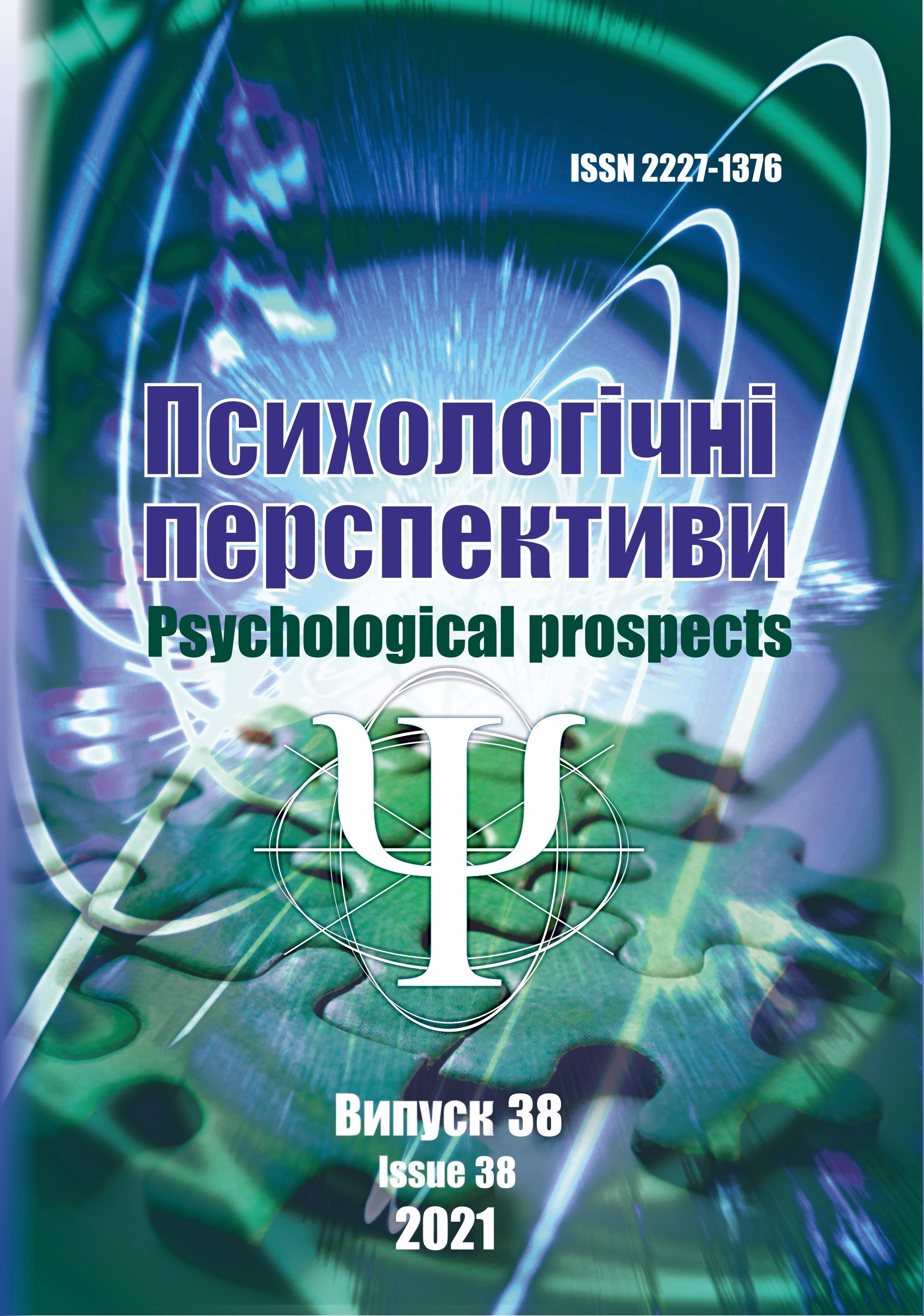Adaptation of the Ukrainian version of the «Spiritual Health Assessment Scale» (SHAS)
DOI:
https://doi.org/10.29038/2227-1376-2021-38-150-162Keywords:
spirituality, spiritual health, self-development, self-actualization, self-realization.Abstract
Purpose. The article presents the results of the Ukrainian-language adaptation of the questionnaire «Personal Spiritual Health Assessment Scale», developed in 2014 by K.L. Gaur (Republic of India), designed to measure the state of mental health of the individual. The scale contains three blocks for measuring spiritual health: Self-development, Self-actualization, and Self-realization. Each block contains seven statements relating to these concepts. The primary purpose of this study is the translation, adaptation and standardization of this questionnaire for the Ukrainian sample.
Methods. The theoretical analysis made it possible to systematize the modern understanding of spirituality and spiritual health of the individual and analyze the components of this construct in the English version of the questionnaire, indicators of its reliability and validity. The potential for the development of spirituality in the recovery process of patients with various types of physical and mental disorders in clinical practice was considered.
The empirical analysis consisted of testing the psychometric properties of the Ukrainian version of the questionnaire. To do this, we performed a procedure of double translation of the text and their expert evaluation, verification of the validity and reliability of the test under psychometric requirements, and standardization of the test on a non-clinical sample.
Statistical data processing was performed using factor analysis.
Results. The procedure of adaptation of the SHAS questionnaire demonstrated high psychometric properties: indicators of reliability and design validity fully meet the psychometric requirements. The internal consistency index (Cronbach's alpha) is 0.79, the retest reliability index is r = 0.76, p <0.01. Constructive validity was assessed by correlating the subscales of the method with the scales of other psychodiagnostic methods and demonstrated satisfactory significance indicators for most indicators. Thus, the «Spiritual Health Assessment Scale» can be considered a quality tool for measuring a person's spiritual health.
Conclusions. Based on the results of the adaptation process of the psychodiagnostic method «Spiritual Health Assessment Scale», it is possible to conclude the possibility and expediency of further use of the Ukrainian version of the questionnaire as a psychodiagnostic tool to determine the objective level of mental health. This tool is attractive for psychotherapy because it contains few statements but describes the essential components of a person's spiritual health. The scale can determine the client's progress in the treatment of various areas. Prospects for further research are the adaptation and possible specification of the questionnaire for narrow groups of the population, particularly those with mental disorders, in the clinical sample.
References
Corrigan, P., McCorkle, B., Schell, B., & Kidder, K. (2003). Religion and spirituality in the lives of people with serious mental illness. Community Mental Health Journal, 39(6), 487–499.
Ellison Spiritual Well-Being Scale (SWBS). (2002). Available from: https://www.lifeadvance.com/spiritual-well-being-scale.html
Fukuyama, M. A., & Sevig, T. D. (2002). Spirituality in counseling across cultures. In P. B. Pedersen, J. G. Draguns, W. R. Lonner & J. E. Trimble (Eds.), Counseling across cultures (pp. 273–295). Thousand Oaks, CA: Sage.
Gaur, K. Gaur. (2014). Measuring Spiritual Health: Spiritual Health assessment Scale (SHAS). IJIRD. P 63–67.
Gomez R, Fisher JW. (2005). The spiritual well-being questionnaire: Testing for model applicability, measurement and structural equivalencies, and latent mean differences across gender. Personality and Individual Differences, 39:1383–1393. DOI: https://doi.org/10.1016/j.paid.2005.03.023
Hage, S. M. (2006). A closer look at the role of spirituality in psychology training programs. Professional Psychology: Research and Practice, 37, 303–310. DOI: https://doi.org/10.1037/0735- 7028.37.3.303
Hathaway, W. L. (2008). Clinical practice with religious/spiritual issues: Niche, proficiency or specialty? Journal of Psychology and Theology, 36, 16–25.
Kearney, M., & Mount, B. (2000). Spiritual care of the dying patient. In H. M. Chochinov & W. Breitbart (Eds.) Handbook of psychiatry in palliative medicine (pp. 357–373). Oxford, UK: Oxford University Press.
Kliewer, S. P., & Saultz, J. (2006). Healthcare and spirituality. Oxford: Radcliffe Publishing
Lukoff, D. (2007). Spirituality in the recovery from persistent mental disorders. Southern Medical Journal, 100, 642–646. DOI: https://doi.org/10.1097/SMJ .0b013e3180600ce2
Pargament, K. I. (2007). Spiritually integrated psychotherapy: Understanding and addressing the sacred. New York, NY: Guilford Press.
Plante, T. G. (2009). Spiritual practices in psychotherapy: Thirteen tools for enhancing psychological health. Washington, DC: American Psychological Association. DOI: https://doi.org/10.1037/11872-000
Puchalski, C. M. (2012). Spirituality in the cancer trajectory. Annals of oncology, 23(3), 49–55.
Rojas Raymond Ronald (2002). Management Theory and Spirituality: A framework and Validation of the Independent Spirituality Assessment Scale. A Dissertation presented to the Faculty of Argosy University in partial fulfillment of the requirements for the degree of Doctor of Business Administration. Available from http://www.prismleadership.com/d.pdf.
Saunders, S. M., Miller, M. L., & Bright, M. M. (2010). Spiritually conscious psychological care. Professional Psychology: Research and Practice, 41(5), 355–362. https://doi.org/10.1037/a0020953
Swinton J (2001) Spirituality and Mental Health Care: Rediscovering a ‘Forgotten’ Dimension. J. Kingsley Publishers, London, Philadelphia.
Kolisnyk, O. P. (2011). Dukhovnyi samorozvytok i dukhovne zdorovia osobystosti [Spiritual self-development and spiritual health of the individual]. Sotsialna psykholohiia – Social Psychology, 4, 52–63. [in Ukrainian].
Lazorko, O. V. (2018). Suchasni perspektyvy vykorystannia dukhovnykh praktyk u roboti klinichnoho psykholoha [The Contemporary Perspectives on Using Spiritual Practices in the Clinical Psychologist` Work]. Psykholohichni perspektyvy – Psychological Prospects Journal, (32), 172–181. https://doi.org/10.29038/2227-1376-2018-32-172-181 [in Ukrainian].
Downloads
Published
Issue
Section
License
Copyright (c) 2021 Psychological Prospects Journal

This work is licensed under a Creative Commons Attribution-NonCommercial 4.0 International License.






